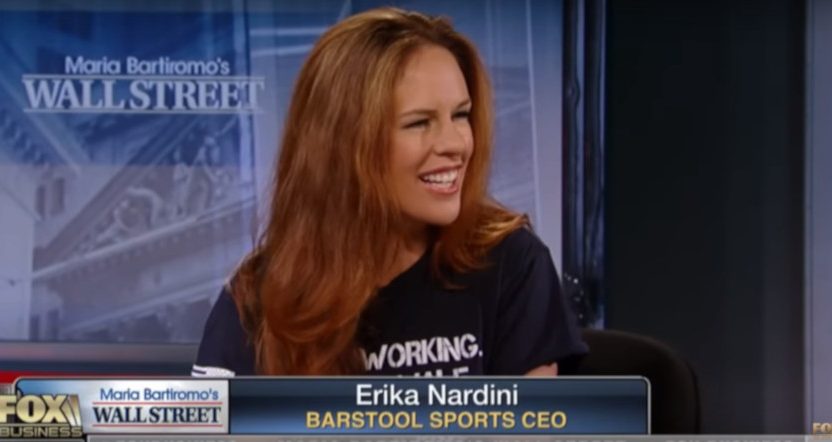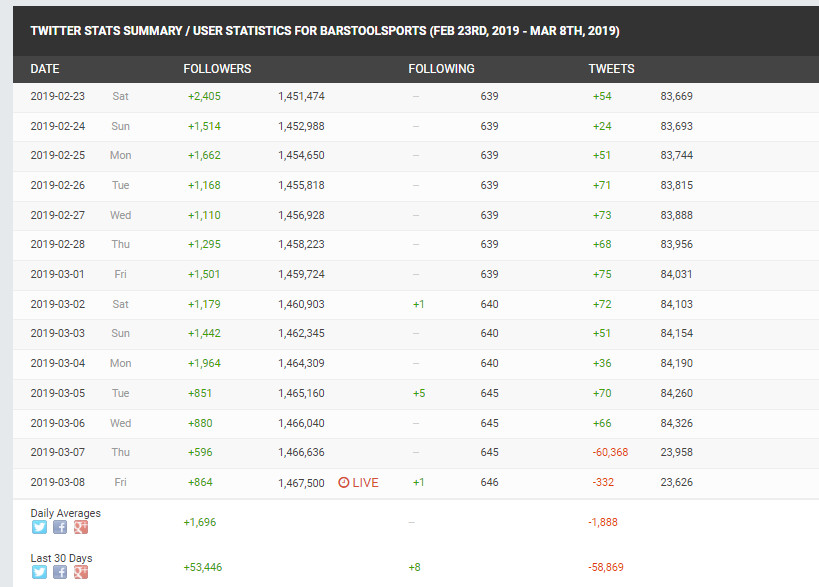There’s been quite the controversy around Barstool Sports this week, with the site criticized by comedian Miel Bredouw for first taking her video without permission and then barraging her with messages and offers (starting with a $50 gift card to their own online store and going up from there) to try and get her to retract a copyright claim she filed. After that, Barstool figures like founder Dave Portnoy admitted they handled the situation badly, with Portnoy saying the company’s lawyer’s behavior (in various offers to Bredouw) was “moronic” and “makes us look like assholes.” The site also saw further criticism from Deadspin, The Daily Beast and elsewhere. There have been two notable recent developments in this saga: Barstool CEO Erika Nardini spoke to Fast Company’s Joe Berkowitz for a piece published Thursday (titled “Barstool Sports CEO Erika Nardini finally responds: ‘What do I have to apologize for?'”) and talked about changing company procedures for responding to copyright claims, but said there was no need for them to apologize, and on Friday, Deadspin’s Tom Ley reported that Barstool Sports’ primary Twitter and Instagram accounts deleted over 61,000 posts on Thursday (60,368 from Twitter, over 1,000 from Instagram).
That second story is worth discussing first. Ley’s information comes from social tracking site SocialBlade, and the Barstool Sports profile there indicates Thursday was far from a standard day for them. In fact, they had 84,326 tweets as of the end of the day Wednesday, and 23,958 as of the end of the day Thursday, a 62 percent drop. Here’s a screenshot of that SocialBlade profile:
There’s some logic to this move for Barstool, especially considering the way that Twitter handles copyright. A certain number of copyright strikes against an account (the exact number is unknown) can lead to the account being taken down permanently, something that’s happened to several people who share sports GIFs or videos there; Jim Weber wrote about how that happened to him for AA back in 2016. Barstool Sports probably wants to do everything in their power to avoid having that happen, as their social accounts play an important role for them both in collecting revenue (from pre-roll ads on video content in Twitter) and in promoting their website, radio shows and more.
With Barstool currently under fire thanks to Bredouw’s complaints, that provides some motivation for many to go look at their old posts and see what else might be questionable. A preemptive mass deletion there makes it harder for them to wind up with another copyright strike, and most of that old content probably wasn’t gathering much engagement any more, making this decision appealing from a cost/benefit analysis perspective. But the sheer number of posts deleted there doesn’t exactly say that everything is fine with Barstool’s social media practices and that the Bredouw case was an isolated incident of them publishing content that they didn’t really have the rights to.
However, Nardini’s comments to Berkowitz seem to take a bit of a different tack. There, she defends their content acquisition procedures, offering no apologies, and saying the issue was with how they responded to Bredouw (an aspect of their policies that they are overhauling). Here’s what she said about their content acquisition and dispute resolution:
In the case of Barstool, one of the most important things I look at it is how many submissions of videos we get every single day. It’s between 500 and 600 videos sent to us. We have a process where every person who sends us a video has to verify that they in fact own the rights to that video and are giving us permission to post it. So we have an established process in place where people submitting us content abide by the policies that we set. Unfortunately, it’s not fool-proof–just like most things associated with DMCA on the web–and we have people who verify that they own the content they are sending to us, which, in fact, they do not own. As a result, it results in the contention around who owns a specific piece of content. We see this all the time.
The second thing that happens with us is that we’re tagged or mentioned in thousands of pieces of content or thousands of mentions and posts per day, so the traffic and volume of videos flowing through us–we have over 700 social accounts–is enormous. I’ve worked hard, and we’ve worked hard to make sure that we have the right policies and procedures around how we manage submissions of video content. We work hard at it, and we don’t want to steal people’s content and we want to be sure we do the right thing. We want to make sure in the cases that someone has verified that they are the creator of a video and it turns out that they’ve lied, that we do right by the creator.
…To be honest, I would say most everything and anything about how we responded was wrong. And what I’ve been working on the last 48 hours is completely overhauling our protocol for how we manage video. We have a very good submission process in place. What we lack is an equally strong resolution process, and that’s everything from the account we use to reach out to a person and the mechanism by which we reach out to a person, and we’re in the process of overhauling all that and that will be done this week. But what I saw was really a failure in communication and resolution.
Later, Nardini expands upon changing that resolution process, saying “I have overhauled every touchpoint of how we manage this process, including who, what, when, where, and why.” And before that, she said “I am not pleased with how we responded.” But while she later says “We were contrite about the way it was handled,” she tells Berkowitz she’s not issuing a personal apology (either to Bredouw or to content creators in general who have had their content improperly used by Barstool), saying “That’s not the fault of Barstool. I can’t apologize for every human on the internet who submits a video under a dummy email account and says it’s theirs.”
Nardini is right that improper content usage goes well beyond Barstool Sports, and that every site that allows users to submit videos is going to run into some issues there. But the mass post deletion this week doesn’t seem to speak to Bredouw’s case being one where the content was properly handled initially and only the response was lacking, and it also doesn’t suggest that Bredouw’s case was an anomaly for Barstool. A mass post deletion itself doesn’t prove anything, but it raises questions about what’s going on. (And it’s notable that the SocialBlade data above is just for the main Barstool Sports account, not the rest of their “over 700 social accounts.”) It will be worth watching to see what Nardini’s changes mean for Barstool’s response process, and to see if there are further issues with their accounts and videos in the future.
[Deadspin/Fast Company; Nardini screenshot from a July 2018 Fox Business interview on YouTube]








